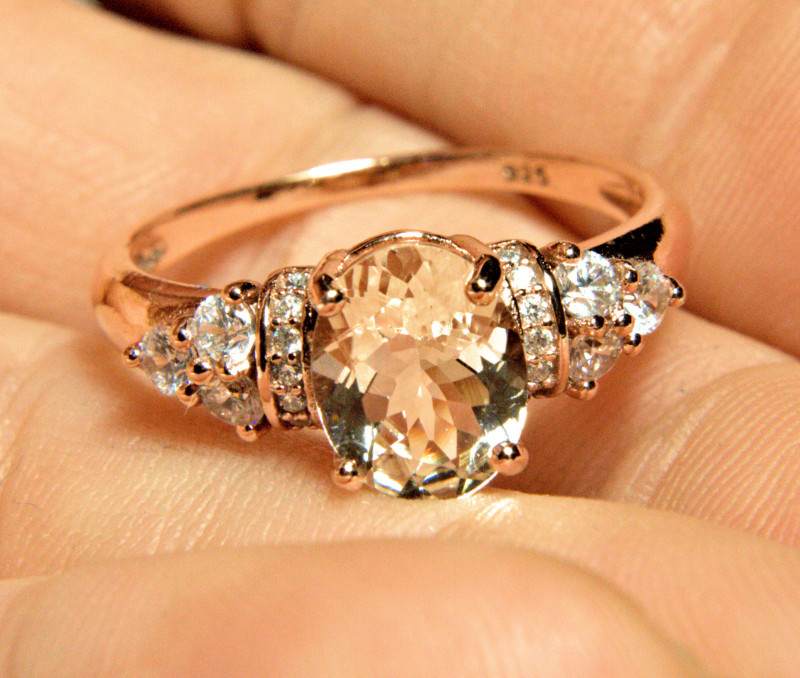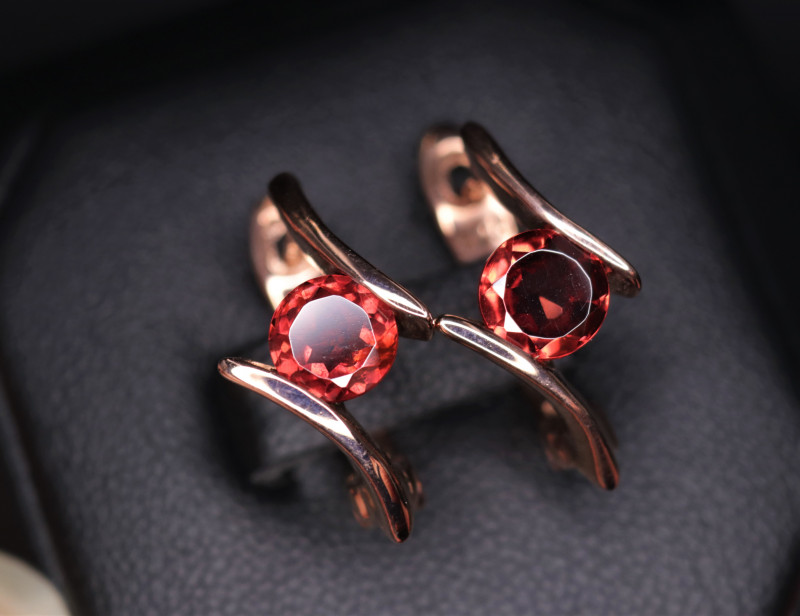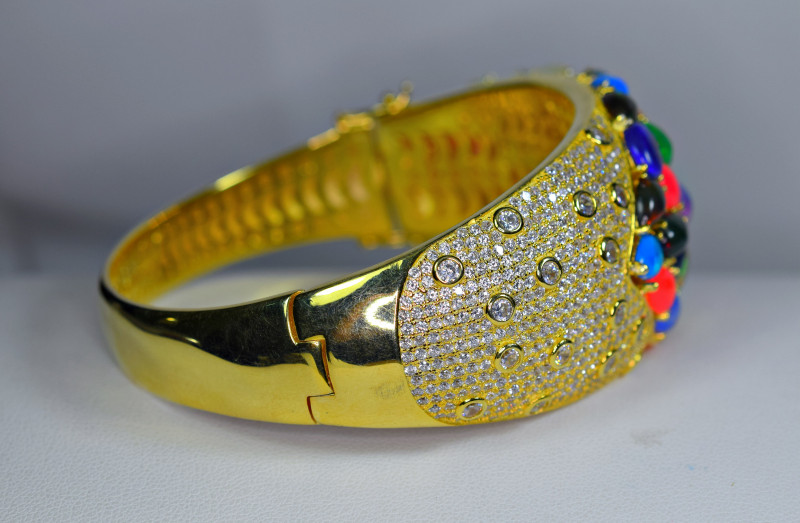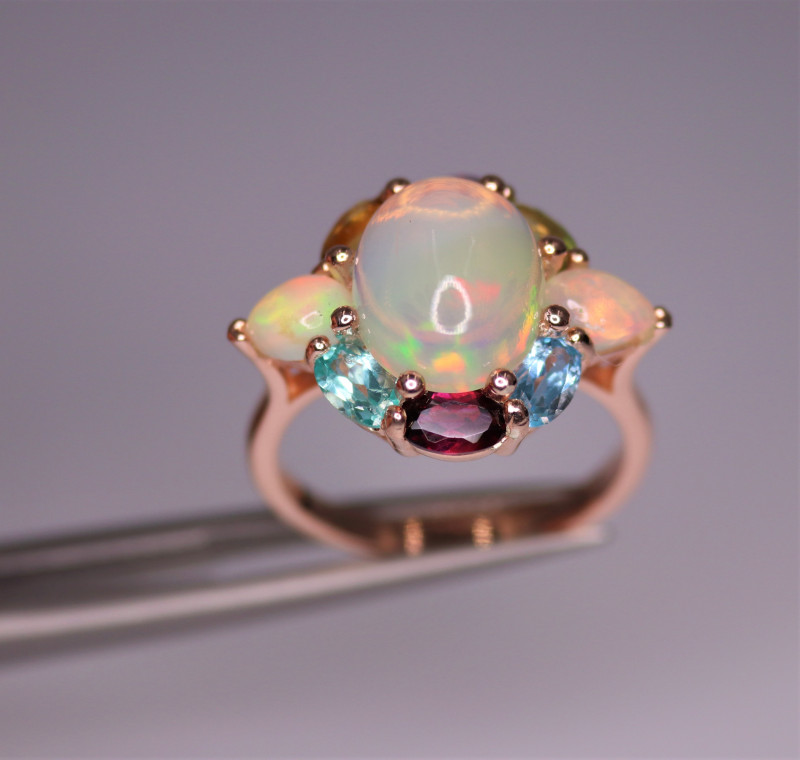
What Does A 925 Gold Jewelry Stamp Mean?
 If you’re a casual jewelry buyer, you may have seen silver or gold jewelry stamped with “925” and been confused. Is it some secret code among jewelers? Nope, it’s simpler than that, but the meaning of a 925 stamp depends on what kind of jewelry we’re talking about.
If you’re a casual jewelry buyer, you may have seen silver or gold jewelry stamped with “925” and been confused. Is it some secret code among jewelers? Nope, it’s simpler than that, but the meaning of a 925 stamp depends on what kind of jewelry we’re talking about.
Most of the time, you’ll see a 925 stamp on silver jewelry. But what does 925 stamped on gold mean?
We’ll be answering that question today as we discuss 925 stamps on gold jewelry, the value of 925 gold, other stamps to be familiar with, and what to know before buying any type of gold jewelry.

What is 925 Gold?
A 925 stamp on jewelry, or any other stamp for that matter, is called a “hallmark.” Other terms for hallmarks are “purity marks” or “quality marks.”
The majority of jewelry hallmarks indicate the type and purity of precious metal used. The main four precious metals are silver, gold, platinum, and palladium.
What code is 925 in jewelry? The number “925” as a jewelry stamp is shorthand for 92.5 percent.
You might already know the 925 stamp associated with sterling silver. A 925 stamp on sterling silver reflects its composition and thus silver purity: 92.5 percent silver and 7.5 percent alloy, most often copper.
Does that mean 925 gold is 92.5 percent gold? No, but that’s a common misconception. It does relate to sterling silver, though.
925 is a hallmark only used when sterling silver is involved.
Can 925 be gold-plated? Yes! In fact, that’s pretty much the definition of 925 gold.
Gold jewelry with a 925 stamp has a sterling silver base covered with a layer of gold — a technique called gold-plating. Gold-plated jewelry with a sterling silver base is often classified as gold vermeil.
Gold vermeil (pronounced ver-may if you’re curious) is higher-quality and higher-value than your typical gold-plating. The gold layer must be at least 0.5 microns thick, according to most country’s regulations. This style is sometimes called “silver gilt.”
Other types of gold-plated jewelry use lower-quality base metals like brass or copper. Plus, most regulations require the plated gold layer to be at least 2.5 microns thick and 10K (~42 percent gold) or higher purity to classify as gold vermeil.
Solid Gold vs. 925 Gold
An important takeaway is that 925 gold is NOT solid gold but rather gold-plated sterling silver.
That means 925 gold jewelry is significantly less valuable than solid gold jewelry. If you’re specifically looking for solid gold jewelry, don’t buy a piece with a 925 stamp.
Both silver and gold jewelry have purity grades and stamps. But silver is rated by a grading system, while gold is rated by its purity, called karatage.

Meaning of Stamps on Gold Jewelry
Gold jewelry has many of its own hallmarks. The ones you’ll see most often are hallmarks indicating the gold purity, measured in karats.
One karat equates to 1 part pure gold out of 24 parts, expressed as a ratio. Therefore, 24-karat (24K) gold is 100 percent gold. Meanwhile, 14K gold is 14 parts gold and 10 parts other metals, making it 58.3 percent pure gold (converted to percentage after you divide 14 by 24).
Below, we’ve listed the popular hallmarks you’ll see indicating karats on gold jewelry.
Gold karat markings and purity:
24K = 999 / 99.9%
22K = 917 / 91.7%
20K = 833 / 83.3%
18K = 750 / 75%
14K = 583 / 58.3%
10K = 417 / 41.7%
Hallmarks on gold jewelry go back to 1200 AD. Just like back then, purity hallmarks on gold are a way to protect consumers by ensuring the items are tested and verified for the true amount of precious metals in their composition.
Countries that are part of the Vienna system, started in the 1970s, use a Common Central Mark, or CCM, which indicates the gold has undergone more rigorous quality testing. If you see a gold karatage hallmark with a balance scales symbol, that’s a CCM.
Production Stamps
The technique used for gold jewelry is also often indicated with a hallmark, such as:
GP or GEP: Gold-Plated or Gold Electroplated — both are synonymous
RGP: Rolled Gold Plate — thinner layer of gold than gold-filled, but thicker layer than gold-plated
HGP or HGE: Heavy Gold Plate or Heavy Gold Electroplated — gold-plated via electroplating but with thickness over 1 micron
GF or 1/20: Gold-Filled — thicker, more durable type of gold layered over base metal, composed of at least 5 percent (1/20) pure gold overall
Each of the hallmarks above are often followed by the karatage (e.g. GP 18K).
 Pictured above: Jewelry hallmark for Dirce Repossi, an Italian jewelry brand | Image credit: Mwsa94, Creative Commons Attribution-Share Alike 4.0 International license
Pictured above: Jewelry hallmark for Dirce Repossi, an Italian jewelry brand | Image credit: Mwsa94, Creative Commons Attribution-Share Alike 4.0 International license
Other Possible Hallmarks
Another hallmark you might see that’s not related to purity is a sponsor’s mark. This is often initials within a shape, indicating who sent the piece to be hallmarked, be it a company, manufacturer, or independent goldsmith.
A sponsor’s mark requires registering the piece with an assay office, an organization that tests metal purity somewhat like labs that certify diamond quality.
The assay office leaves its own hallmark as well. For example, a sideways anchor hallmark is the mark of Assay Office Birmingham, meaning that specific office tested and verified the piece’s purity.
You may also see a stamp indicating the year the jewelry was hallmarked, given as a letter. The letters follow an alphabetical order starting from 1998 as a. For instance, 2011 is m, 2012 is n, 2013 is o, and so on.
There are also traditional and commemorative marks, but these are less common.
Regulations surrounding the requirement of jewelry hallmarks differ by country. Many countries require hallmarking, but places like China, India, and Italy have voluntary hallmarking.
On the topic of Italy…
What Does 925 Italy Mean on Gold?
Another 925 hallmark you might see on gold is “925 Italy” or “Italy 925.”
A 925 Italy hallmark on gold jewelry means the piece was made in Italy and consists of sterling silver with gold-plating. Silver jewelry with a 925 Italy stamp means it’s 92.5 percent silver (sterling silver) that was made in Italy.

Is All Gold Jewelry Stamped?
Not all gold jewelry has hallmarks. While a lack of any stamp may indicate there’s no real gold in the piece, that’s not always the case.
Not every country has laws regulating gold jewelry hallmarks; even for the countries that have these laws, like the US, the jewelry may have been manufactured before the law passed.
Speaking of old pieces, hallmarks can also wear away with time. This is especially true for items like gold rings, as they’re regularly in close contact with the skin and have a greater chance of contacting other substances (with its location on the hand).
If there aren’t any stamps, how can I tell if jewelry is real gold?
If you come across gold jewelry with no stamps, it’s best to have the piece tested by a jeweler. With an acid test, the jeweler can establish the karatage of the gold or decipher if the piece is gold plated.
With all the vernacular and minutia covered, it’s time to focus on buying 925 gold jewelry.

Value of 925 Gold
Is gold marked 925 worth anything? Absolutely. Gold will never be worthless, though gold-plated jewelry marked with 925 will carry significantly lower value than solid gold.
What karat is 925 in gold? It varies from piece to piece. As we’ve discussed, “925” doesn’t reflect karatage, so 925-stamped gold jewelry can have 10K gold, 24K gold, or any karatage in between.
Is 925 gold pawnable? Yes, 925 gold is pawnable, but you won’t get nearly as much as you would from solid gold. You will get more than you would for gold-plated jewelry with cheaper base metals, though.
The karatage of the gold plating also affects the value, along with the piece’s overall weight, the brand, and the current value of gold.
The current average prices for different types of 925 gold jewelry (without additional elements like gems) are:
Necklaces: $7 to $50
Bracelets: $10 to $70
Rings: $10 to $100
Earrings: $13 to $70
If you’ve just bought some 925 gold, you’ll want to know how long it will last, right?
Does 925 Gold Fade?
For gold jewelry, the aspects of its longevity are tarnishing and fading.
Tarnishing describes a reaction between the metals with moisture and sulfur, often oxidation, creating a corroded surface layer. This can result in the color and/or luster dulling. Fading is a more general term for a loss of brightness, strength, or color, so tarnishing can count as a type of fading.
Pure gold is known for never tarnishing, but 925 gold is gold-plated, meaning tarnishing is inevitable. Therefore, 925 gold jewelry will fade with time.
Because pretty much all 925 gold jewelry is gold vermeil, it can last up to 20 years or more with proper maintenance. Caring for your gold jewelry is crucial if you ever plan on reselling it.

Is 925 Gold Your Perfect Ten?
Some purists may only look for solid gold, but solid gold also has downsides like lower durability preventing everyday wear and steep price points.
925 gold offers the best of both worlds for those wanting to invest in sterling silver and gold. For casual gold jewelry lovers, 925 gold is a more affordable, but still refined, alternative to solid gold.
Ready to shop? Browse our collection of gold jewelry!
Search the Fashion Encyclopedia
Related Auctions
Related Articles
How to Buy Jewelry on the Internet. There are so many types of beads. It will be up to you to determine where you want to start, all authentic gemstone beads or if you will also use glass beads ‘man made’ as well as gold and silver beading. You
10th Apr 2019
How to buy a ruby for your ring or pendant,Make sure that you learn as much as you can about Rubies, prior to buying a ring or a setting that you are going to add Rubies to. Like Diamonds, Rubies can be flawed, and imperfect The Ruby is one of the most b
10th Apr 2019
Latest Articles
Titanium is a popular jewelry metal known for being lightweight, durable, and affordable. Learn all about titanium, how it compares to similar metals, and the pros and cons of titanium jewelry.
7th Feb 2023
Learn all about tungsten jewelry - from its history and uses to its durability and care. By the end of our guide, you’ll know if tungsten is right for you!
7th Feb 2023
Thinking about adding some timeless white gold jewelry to your fine accessories collection? Here’s all there is to know about sophisticated white gold!
29th Jan 2023






